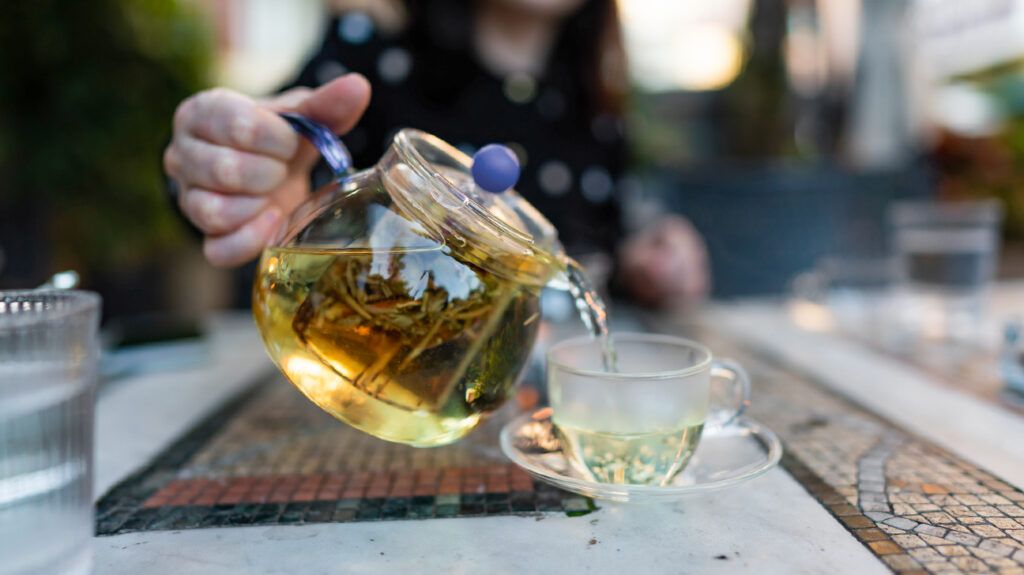L-theanine is an amino acid that occurs naturally in green and black tea. It is also available in supplement form. The substance may provide some general health benefits, but it is not a replacement for conventional treatments for bipolar disorder.
An estimated
Treatment often consists of medication and psychotherapy and can help improve the quality of life in people with bipolar disorder.
Some individuals may be curious about supplementing their current therapy with supplements such as L-theanine.
L-theanine may provide some health benefits, but evidence does not support its use as a treatment for bipolar disorder.
This article reviews L-theanine in more detail and how it may help with bipolar disorder.

Both green and black tea contain the amino acid L-theanine.
Evidence suggests that about 200–400 milligrams (mg) of water-soluble amino acid a day may help relieve stress.
People with various mental health conditions, such as anxiety, depression, or bipolar disorder, may benefit from the effects of L-theanine.
However, the amino acid is not a substitute for conventional medical treatments for bipolar disorder.
People who wish to try L-theanine as a complementary therapy should speak with their healthcare team.
Bipolar disorder is a type of mood disorder involving severe mood swings that can affect a person’s daily activities and quality of life.
According to an older study from 2014,
L-theanine may provide some health benefits, but there is no evidence to suggest it can effectively treat bipolar disorder or any other mental health or mood disorder.
Several studies examine the potential benefits of L-theanine.
A small 2021 study involving 69 Japanese participants found that L-theanine
- supporting healthy sleep patterns
- reducing stress
- improving mood
A 2020 systematic review found evidence that L-theanine may help reduce stress and anxiety and improve cognitive function and mood.
L-theanine may provide several general health benefits.
Evidence from the previously mentioned
A person can get L-theanine by drinking green or black tea. However, most studies look at amino acid concentrations of between 200 and 400 mg. A person is unlikely to get this amount through drinking tea alone.
Additionally, the effects of L-theanine may vary from person to person. Individuals should not discontinue medications for bipolar disorder or make other changes to their therapy to use L-theanine supplements without consulting a healthcare professional.
Before taking L-theanine, a person should discuss its use with a doctor.
Studies looking at the benefits of L-theanine
However, an individual should follow dosing instructions from a doctor or on the supplement label to avoid overdosing.
Anyone can take L-theanine.
However, while it is unlikely to interfere with medications or cause unwanted side effects, people with bipolar disorder should speak with a doctor before taking any over-the-counter supplement.
A person should also avoid stopping other treatments or therapies without first seeking medical advice.
Despite
The following sections answer common questions about L-theanine and bipolar disorder.
Can L-theanine cause mood swings?
Evidence suggests that L-theanine
Any high or low moods people experience while drinking green or black tea containing L-theanine may be due to an underlying mood disorder.
What is a natural mood stabilizer for bipolar disorder?
Mood stabilizers are a type of medication for treating bipolar disorder.
Some people may find that natural therapies and substances help with bipolar disorder symptoms.
Complementary therapies that
- activities such as exercise and yoga
- light therapy
- acupuncture
- mindfulness therapies
- supplements such as
While these may help with some bipolar disorder symptoms, a person must discuss any treatment changes with a doctor before discontinuing a current therapy or starting a new exercise program or supplement.
This is because some complementary therapies can negatively interact with mood management or some medications.
Bipolar disorder resources
Visit our dedicated hub for more research-backed information and in-depth resources on bipolar disorder.
People with bipolar disorder may benefit from taking L-theanine supplements or drinking green or black tea. L-theanine may help with mood, stress, anxiety, and cognitive functioning.
However, supplements are not an effective replacement treatment for bipolar disorder.
While studies suggest L-theanine is safe for most people, it is important for a person to discuss L-theanine supplements with a doctor before taking them.
